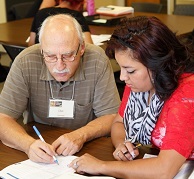A tutor helps to prepare a young mother to take the GED.
Earlier this year, the Child and Family Development Committee reviewed a group of grants totaling more than $200,000, all directed at organizations that help parents of young children become and remain able to support themselves and their families. The organizations do work ranging from job skills training, to family case management, to basic financial training and services. They also work with parents who are in various stages of the employment cycle — those needing skills and training to get a job as well as those in jobs who need support to keep a job.
Rather than just reviewing individual proposals, the Committee instead reviewed the whole “cluster,” or group of proposals with the ultimate goal of helping parents of young children become able to support themselves financially. As the year goes on, the Committee will evaluate similar groupings of grants to organizations in other areas, including early childhood development, family resource centers, early learning councils and home visitation programs. The Committee will also consider the grant requests after spending half of each meeting learning about and evaluating each of these areas in greater depth than they have in the past. (Other program committees at the Foundation are implementing a similar approach.)
Senior Program Officer Elsa Holguín hopes that the ultimate result of this shift in how the Committee evaluates requests will be that the Foundation plays an active role in raising whole sectors of work. These improvements may come from bringing grantee organizations together, or being able to access more resources and funding locally and nationally, or providing more proactive support beyond simple funding to grantees as they improve how they serve individuals and families.
“Moving a field of work to another level feels like such an appropriate role for a community foundation,” says Holguín.
Committee Chair Lisa Reckler Cohn said the Committee also hopes that this new way of looking at grants will help the group be “much more knowledgeable, thoughtful and organized.” She also hopes that as committee members see a whole area of work in depth, they will be able to “see where the possibilities are for working together, for sharing best practices.” She goes on to wonder, “Who knows what kinds of innovations might come from that?”
As the Committee reviewed the workforce development cluster, its members learned how focusing on two generations of families in poverty — the children and the parents — can result in greater, longer-lasting change. Liddy Romero, the CEO of WorkLife Partnership, one of the grantees in this group explains, “If an adult in the household can keep a job, that stability benefits the children.” WorkLife Partnership partners with employers to ensure that their employees have skills and support to stay in their jobs.
The Committee also learned that even as Denver’s economy is booming, many families are struggling to provide for basic needs including housing, child care and food. “Even in good economies, people get left behind,” says Romero. Laurie Harvey, the CEO of the Center for Work Education and Employment, CWEE, another grantee in the group, says that even as companies move high-tech jobs to Denver and to Colorado, overall it has become more difficult to find good entry-level work that provides a living wage and adequate benefits.
Moreover, Harvey says that in our more mobile economy, now clients who face significant economic challenges are missing many of the supports that clients in similar situations had ten years ago. “They are less likely to have family nearby,” she says. “They have no support structure to fall back on.”
Both CWEE and WorkLife Partnership work with single parents of young families. They also work actively with employers. Harvey says that their relationships with a number of employers grew out of the Child and Family Development’s last evolution in their grantmaking process, when they asked grantees to focus more on outcomes. That caused CWEE to work on locating and nurturing relationships with what both Harvey and Romero refer to as “quality employers,” employers who offer jobs with living wages and benefits so that their workers can support their families. “That focus on employers has begun to have a really positive impact,” says Harvey. “We added 15 employers to our network last year and placed more people in full-time positions with benefits than ever before.”
Romero also talks about the critical role Rose Community Foundation has played in her young organization’s growth and evolution. WorkLife Partnership is the only organization in the Rocky Mountain region that focuses on keeping employees in jobs rather than getting them into jobs. “I am proud to say that Rose Community Foundation was one of the first local foundations to support us three years ago,” she remarks. Now, she says, “Workforce is finally making its way into the limelight,” and many players are beginning to focus resources on this issue. But, says Romero, “We need philanthropy, alongside the federal and state funding.”
Both organizations are looking forward to collaborating with their peer organizations which they hope will happen more as a result of clustering grants. “We have to get together as a workforce industry,” says Romero.
“We are really looking forward to gathering with colleagues to share best practices, track new and existing policies at the federal, state and county levels,” says Harvey.
Committee chair Cohn says she can already see a marked difference in the understanding the Committee brings to its evaluation of grant proposals. “This approach has made us much more focused, intentional and educated,” she says. She goes on to remark, “It is like the difference between reading Anna Karenina, or taking a full survey class about Russian literature.”

